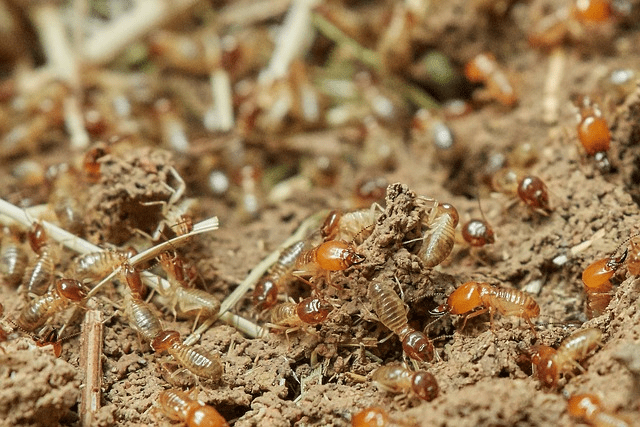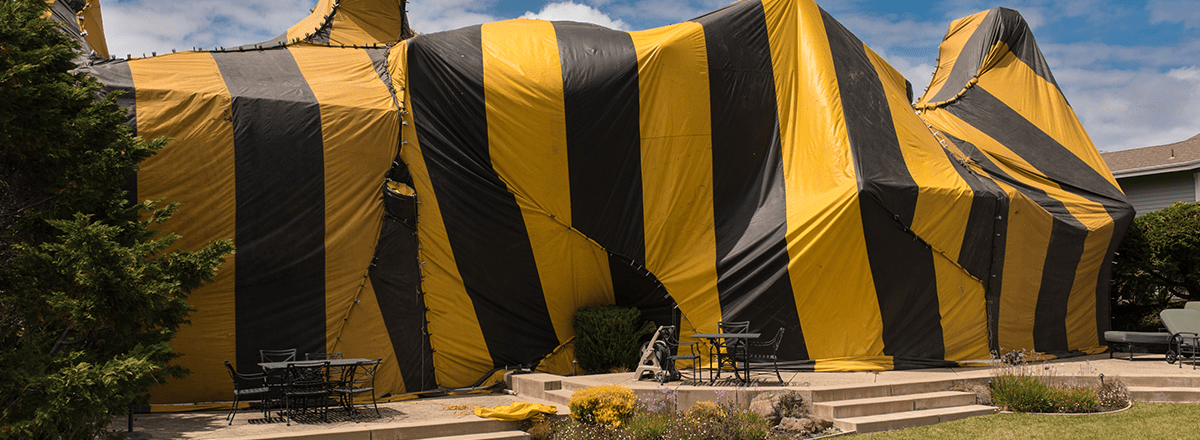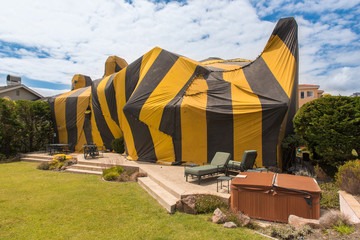Orange Oil Termite Control vs. Fumigation

When comparing orange oil to fumigation, it’s important to understand the benefits and limitations of each approach. Orange oil offers a natural and eco-friendly alternative to traditional fumigation methods. Orange oil, derived from orange peels, contains d-limonene, a compound known for its ability to kill termites on contact. Unlike fumigation, which involves tenting the entire structure and using chemical fumigants, orange oil targets specific areas of infestation without the need for extensive tenting. Additionally, orange oil leaves behind minimal residue and is considered safe for humans and pets. However, it’s essential to note that orange oil may not be as effective as fumigation for severe or widespread termite infestations. Multiple applications of orange oil may be required to fully eradicate termite colonies, leading to increased time and cost. Additionally, orange oil may not be suitable for all termite species, and there is a risk of reinfestation without proper preventative measures. Therefore, while orange oil presents a natural and environmentally friendly option, homeowners should carefully consider its limitations and consult with professionals to determine the most suitable treatment approach.
Pros and Cons of Orange Oil Termites
When considering the pros and cons of orange oil treatment, it’s important to weigh its benefits and limitations. Orange oil, derived from orange peels, contains d-limonene, a compound known for its ability to kill termites on contact. One of the main advantages of orange oil is its natural and eco-friendly composition, making it a safe option for both humans and pets. Additionally, orange oil offers minimal disruption to the home during application, as it targets specific areas of infestation without the need for extensive tenting. Another benefit is that orange oil leaves behind minimal residue, ensuring a clean and safe environment post-treatment. However, it’s essential to note that orange oil may not be as effective as traditional chemical treatments for severe or widespread termite infestations. Multiple applications of orange oil may be required to fully eradicate termite colonies, leading to increased time and cost. Additionally, orange oil may not be suitable for all termite species, and there is a risk of reinfestation without proper preventative measures. Therefore, while orange oil termite treatment presents a natural and environmentally friendly option, homeowners should carefully consider its limitations and consult with professionals to determine the most suitable treatment approach.

How do you know if you have drywood termites?
Only with a professional termite inspector can we be certain if its drywood termites. A thorough inspection will see your home in all directions indicating if dry wood termites or other wood-destroying insects are eating your home. You will be provided with a complete report with findings and suggestions. Although recommendations are based on inspections by homeowners and contractors, a good expert should find all the information they need in the process. Remember dry wood termites can easily be removed, but this does not mean that the termites will ever return to life again.
What is the best orange oil for termites?
We use orange oil for termites as well. It contains dilimonene, the primary killing agent which is intolerable in terms of pest like termites. Apply orange oils to kill termites in the garden in the best way and avoid harmful chemicals and toxins.
When it comes to pest control, many homeowners are now turning to organic methods for a safer and more environmentally friendly approach. Organic pest control solutions, such as orange oil treatment for termites, offer effective alternatives to traditional chemical pesticides. By harnessing the power of naturally occurring compounds, like those found in orange oil, homeowners can effectively treat termite infestations without posing risks to human health or the environment.
Termite galleries are intricate networks of tunnels that termites construct within wood structures. These galleries serve as pathways for termites to travel, feed, and communicate within their colony. Understanding termite galleries is essential for effective termite control, as they provide valuable insight into the extent of an infestation and the location of termite activity within a property.
How to treat termites, and diy treatment
Treating termites requires careful planning and execution to effectively eliminate the infestation and prevent future damage to your property. While professional pest control services offer comprehensive treatment options, some homeowners may opt for do-it-yourself (DIY) treatments. DIY termite treatment typically involves the application of termiticides or bait stations to targeted areas of infestation. However, it’s important to note that DIY treatments may not always be as effective as professional solutions, as proper application techniques and thorough coverage are essential for maximum efficacy.
Using orange Peels, and fruit juice to stop termite problems
Using orange peels and fruit juice as a remedy to deter termite problems is a common DIY approach adopted by some homeowners. . Similarly, fruit juices like lemon or pineapple juice may contain citric acid, which can also act as a deterrent to these pests. While these methods may offer temporary relief from termite infestations, they are not a foolproof solution and may not provide long-term protection.
Residual effectiveness and active ingredient for new infestation
When considering residual effectiveness and the active ingredient for addressing new drywood termite infestations, it’s crucial to understand the role of the treatment method and its longevity in preventing future infestations. Termite treatments vary in their residual effectiveness, with some products offering longer-lasting protection than others. Therefore, homeowners should prioritize treatments that offer both a potent active ingredient and long-lasting residual effectiveness to effectively protect their properties against drywood termite infestations.
Is fumigating completely safe, What about direct contact ?

Fumigating is generally considered safe when conducted by trained professionals following proper protocols and safety measures. However, it’s essential to adhere to safety guidelines and precautions to minimize any potential risks associated with the fumigation process. You should vacate the premises during fumigation and follow instructions provided by the pest control company to ensure their safety and the safety of their pets.
How do you kill subterranean termites
Killing subterranean termites typically requires the application of specialized termite control methods designed to target these pests in their underground colonies. One effective approach is the use of liquid termiticides, which are applied to the soil around the perimeter of a structure to create a protective barrier against termite intrusion.
Can you use essential oil or naturally occurring essential oil for subterranean termites
While essential oils and naturally occurring substances may have some repellent properties against termites, they are generally not considered effective for eradicating subterranean termite infestations on their own.
effective insecticide used in tent fumigation for wood members
The most common and effective insecticide used in fumigation is typically sulfuryl fluoride, which is commonly known by the brand name Vikane. Sulfuryl fluoride is a powerful fumigant that penetrates deep into the wood, targeting and eliminating termite colonies and other wood-destroying pests. During the fumigation, the structure is sealed with a tent or tarp, and sulfuryl fluoride gas is introduced to saturate the entire enclosed space, effectively penetrating the wood members and reaching hidden termite infestations.
Get rid of termites with natural d limonene
Getting rid of termites with natural d-limonene, which is commonly found in citrus oils like orange oil, is a popular natural approach to termite control. D-limonene is known for its strong solvent properties and its ability to dissolve the exoskeleton of termites, ultimately leading to their demise. When applied to termite-infested areas, d-limonene penetrates the wood and comes into contact with termites, effectively killing them on contact.
General structure cleaning for pets and ants
General structure cleaning for pets and ants involves several key steps to ensure a clean and pest-free environment. First, it’s essential to regularly clean and remove any food crumbs, spills, or leftovers that may attract ants or other pests.
For pet-related cleaning, regularly grooming pets and cleaning their bedding can help reduce allergens and pests like fleas and ticks. Vacuuming carpets, rugs, and upholstery where pets spend time can also help remove pet hair and dander, which can attract pests.
Using pet-safe cleaning products is crucial to ensure the safety of your furry friends. Avoid using harsh chemicals or pesticides that may be harmful to pets. Instead, opt for natural or pet-friendly cleaning solutions.
In summary, regular cleaning and maintenance, along with pet grooming and using pet-safe cleaning products, are essential steps to maintain a clean and pest-free environment for both pets and humans. Contact us now, or read more at our Blog.
Proudly powered by BerryRyan


